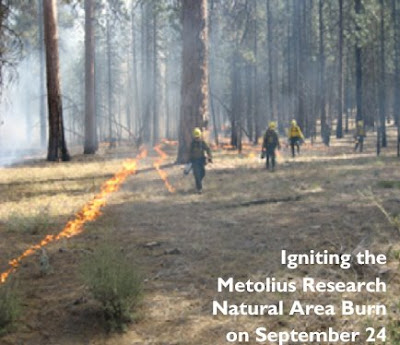
In September Wildfire Today reported on the escaped prescribed fire on the Deschutes National Forest near Sisters, Oregon. The U.S. Forest Service investigated the incident and on December 3 issued their report. Wildfire Today reviewed it and here is a brief summary.
The 30-acre "Unit 61" project area was part of the Metolius Research Natural Area and had been treated with prescribed fire 3 times previously in the last 20 years. The 1,000-hour fuel moisture and the Energy Release Component were both within normal ranges.
The test fire and ignition went well, and at 6:07 p.m. all resources assigned to the burn returned to their station at Sisters, Oregon. When they left the fire there was "slight precipitation" on the burn unit.

The next day at 11:45 a.m. while the local resources were preparing to burn a different unit, it occurred to someone that no one had checked the fire since 6:07 p.m. the day before. When an engine arrived to check it at 12:25 p.m. they discovered a 5-10 acre slopover. By 12:52 p.m. additional resources had been ordered, including a 5-10 person hand crew, 2 engines, a helicopter with bucket (but none was available), air attack, a dozer, and one heavy air tanker.
The prescribed fire was declared an escape and eventually burned 1,847 acres, took 9 days to contain, and cost $4 million.
Some of the causal factors identified in the report:
- The fire was not patrolled between 6:07 p.m. and 12:25 p.m. the next day. It is likely that an evening or morning patrol would have detected and controlled fire found outside the unit boundary.
- No plan was established for multi-ignition prescribed burn operations, which lead to focus on the next ignition of the Highway 20 Project (Unit #25) and missing the patrol and mop-up phases of Unit #61.
- The Burn Plan did not adequately document the prescribed burn organization, the patrol plan, and requirements for mop-up. The patrol plan was vague.
- There was a perception of a pressure to burn more acres (either through the fire organization or through a sense of individual responsibility) that may have led to urgency to move from one unit to the next without adequate attention to the previous day, as well as a perception of being understaffed to meet expectations.
We regret the mistakes that led to the Wizard Fire," says Supervisor Allen. "We will further examine the prescribed fire program this winter and develop an action plan aimed at preventing recurrence of a similar event in the future. I expect the action plan to be implemented prior to the Spring 2009 prescribed fire season in the Deschutes National Forest.
We congratulate the Deschutes National Forest for issuing this report fairly quickly and for making it publicly available. Lessons learned are valuable and contribute to our knowledge base while reducing the chances of repeating the same "causal factors".




No comments:
Post a Comment